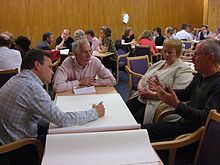World café (conversation)

A world café is a structured conversational process for knowledge sharing in which groups of people discuss a topic at several small tables like those in a café. Some degree of formality may be retained to make sure that everyone gets a chance to speak.[1] Although pre-defined questions have been agreed upon at the beginning, outcomes or solutions are not decided in advance.[2][3] The assumption is that collective discussion can shift people's conceptions and encourage collective action.[4] Events need to have at least twelve participants, but there is no upper limit.[5] For example, in Israel in 2011 an event called 1000 Tables was hosted in several cities on a single day as part of a series of social justice protests held around that time, and around a thousand people participated.[6]
Knowledge café
[edit]A knowledge café, as developed by David Gurteen, has small tables, and a single open ended-question for all of the groups to discuss. The aim is to maximise time spent in conversation, so that time spent with any one person presenting is minimised. Discussion at each table is open and there is no formal attempt to capture what is said—the value is in the conversation itself.[7]
Modified world café
[edit]Modified world café is a variant developed in 2019 and structured in two rounds which have the same length and an equal number of tables. Each group is provided with a goal to work on and each round is ended by plenary presentation. After the intermediate presentation, all members of each group except one (called the "host") are asked to move their seats to a new table and start a new round of discussion that is concluded by a final plenary presentation.[8]
Application in Japanese clinical clerkship and postgraduate (residency) clinical teaching showed a relevant increase of the perceived usefulness and consent in respect of the product of the discussion groups.[8]
See also
[edit]References
[edit]- ^ Elliott, Janice; Heesterbeek, Sara; Lukensmeyer, Carolyn J.; Slocum, Nikki (2005). Steyaert, Stef; Lisoir, Hervé (eds.). Participatory methods toolkit: a practitioner's manual. [Brussels]: King Baudouin Foundation / Flemish Institute for Science and Technology Assessment. pp. 185ff. ISBN 978-90-5130-506-7.
- ^ Bache, Christopher M. (28 August 2008). The Living Classroom: Teaching and Collective Consciousness. SUNY Press. ISBN 978-0-7914-7646-8.
- ^ Liteman, Merianne; Campbell, Sheila; Liteman, Jeffrey (14 July 2006). Retreats That Work: Everything You Need to Know About Planning and Leading Great Offsites. John Wiley & Sons. pp. 48–. ISBN 978-0-7879-8643-8.
- ^ Lewis, Sarah (16 March 2011). Positive Psychology at Work: How Positive Leadership and Appreciative Inquiry Create Inspiring Organizations. John Wiley & Sons. ISBN 978-1-119-99621-7.
- ^ Dickson, Graham; Bill Tholl (13 January 2014). Bringing Leadership to Life in Health: LEADS in a Caring Environment: A New Perspective. Springer Science & Business Media. pp. 146–. ISBN 978-1-4471-4875-3.
- ^ Hartman, Ben (10 September 2011). "Round table discussions held in cities across Israel". The Jerusalem Post.
- ^ Gurteen, David (2008). "How to run a Knowledge Café". Gurteen. Retrieved 15 February 2017.
- ^ a b Shimizu, Ikuo; Mori, Junichiro; Tada, Tsuyoshi (January 2, 2019). ""Modified World Café" workshop for a curriculum reform process". The Asia Pacific Scholar. 4 (1): 55–58. doi:10.29060/TAPS.2019-4-1/SC2000.
Further reading
[edit]- Allee, Verna (2003). The Future of Knowledge: Increasing Prosperity Through Value Networks. Amsterdam; Boston: Butterworth-Heinemann. pp. 146–148. doi:10.4324/9780080507156. ISBN 9780750675918. OCLC 50955069.
- Brown, Juanita; Isaacs, David; The World Café Community (2005). The World Café: Shaping Our Futures Through Conversations That Matter. Berrett-Koehler Publishers. pp. 96–98. ISBN 9781576752586. OCLC 56876852.
- Brown, Juanita; Homer, Ken; Isaacs, David (2007). "The World Café". In Holman, Peggy; Devane, Tom; Cady, Steven (eds.). The Change Handbook: The Definitive Resource on Today's Best Methods for Engaging Whole Systems (2nd ed.). San Francisco: Berrett-Koehler Publishers. pp. 179–194. ISBN 9781576753798. OCLC 66527256.
- Gronau, Norbert (2002). "The Knowledge Café: A Knowledge Management System and Its Application to Hospitality and Tourism". Journal of Quality Assurance in Hospitality & Tourism. 3 (3–4): 75–88. doi:10.1300/J162v03n03_05. S2CID 154402005.
- Kazi, Abdul Samad (2004). Knowledge Management in the Construction Industry: A Socio-Technical Perspective. Hershey, PA: IGI Global. p. 61. ISBN 9781591403623. OCLC 56065494.
- Pasher, Edna; Ronen, Tuvya (2011). The Complete Guide to Knowledge Management. Hoboken, NJ: John Wiley & Sons. pp. 112–114. doi:10.1002/9781118983782. ISBN 9781118001400. OCLC 656770760.
- Senese, Mara (2012). "The World Café: Active Involvement Through Meaningful Conversation". In Klev, Roger; Levin, Morten (eds.). Participative Transformation: Learning and Development in Practising Change. Farnham; Burlington, VT: Gower. pp. 159–. ISBN 9781409423782. OCLC 769546106.
- Singh, Shawren (2015). "Innovation through conversation: the use of Knowledge Café in the public sector". In Ramjugernath, Deresh (ed.). ICIE 2015 3rd International Conference on Innovation and Entrepreneurship. Academic Conferences Limited. pp. 191–193. ISBN 9781910309919.
- Skyrme, David (2001). Capitalizing on Knowledge: From E-Business to K-Business. Oxford; Boston: Butterworth-Heinemann. pp. 125–. doi:10.4324/9780080500683. ISBN 9780750650113. OCLC 46512211.
- Steier, Frederick; Brown, Juanita; Mesquita da Silva, Flavio (2015). "The World Café in Action Research Settings". In Bradbury, Hilary (ed.). The Sage Handbook of Action Research: Participative Inquiry and Practice (3rd ed.). London; Thousand Oaks, CA: Sage Publications. pp. 211–219. doi:10.4135/9781473921290.n21. ISBN 9781446294543. OCLC 915115903.
- Yendol-Hoppey, Diane; Dana, Nancy Fichtman (2010). Powerful Professional Development. Thousand Oaks, Calif.: Corwin Press. pp. 83–. ISBN 9781412979757. OCLC 464584714.
External links
[edit]- The World Café website
- The World Café Community website (by subscription)
- The Knowledge Café website
